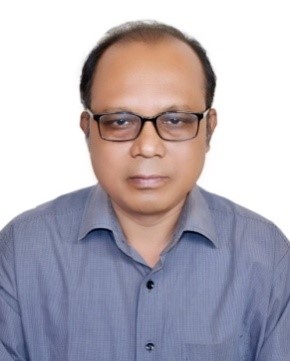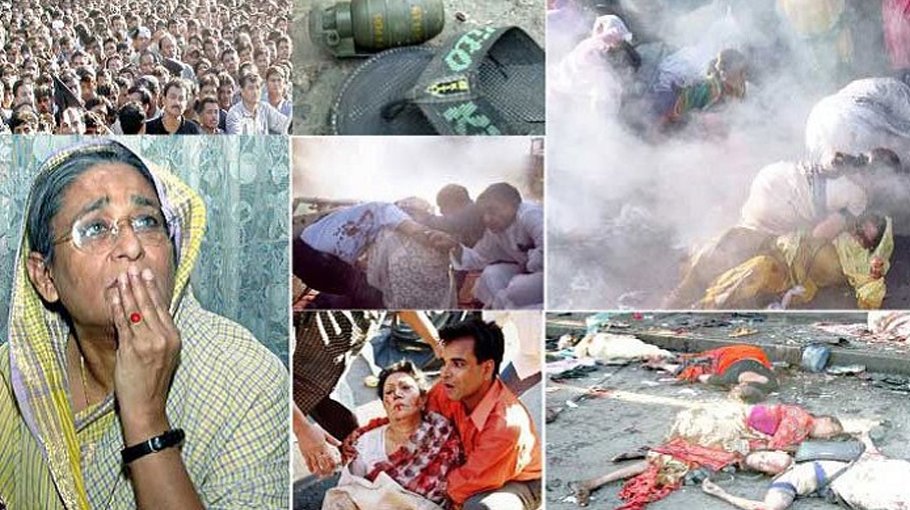Grisly August 21 grenade attack

It was the deadliest day in Bangladesh's political history since the assassination of Bangabandhu Sheikh Mujibur Rahman and his family members. I was assigned to cover the anti-terrorist rally of Awami League in front of the party’s central office Bangabandhu Avenue in Dhaka where Awami League President Sheikh Hasina was addressing as the chief guest on August 21 in 2004. However, I always maintain a distance from the podium when I cover political programme so that I can listen to the leaders’ speech clearly. Sheikh Hasina finished her address and I ordered a cup of tea at a stall located at the opposite side of the Awami League party office.
As soon as Sheikh Hasina concluded her address pronouncing ‘Joy Bangla, Joy Bangabandhu’ at about 5:22pm, hundreds of leaders and workers like me who gathered there got stunned due to the thudding sounds of grenade and bullets. At first I could not understand what was happening and what I should do. I was in a fix for a moment but within blink of an eye, I started running away from the area but my legs got stuck in dead bodies and I fell on them.
I felt a tremor and saw thick smock coating the whole area with the sounds of groaning that were emitting from the wounded people. Within a moment the entire area turned into a horror zone. Capital Dhaka’s air and sky had become heavier with the groaning and screams of the people as a festival of mass killing was going on. The leaders and workers, who escaped attack, again thronged the area amid firing and recovered the dead bodies and critically injured persons. Later, I also along joined the Awami League leaders and workers to rush the critically injured people to Dhaka Medical College Hospital. But those who were on the spot after the grisly carnage were in dark whether Sheikh Hasina was alive?
The horror scene that I witnessed at Bangabandhu Avenue and Dhaka Medical College Hospital still haunts me in many ways as I was completely traumatised by the state-sponsored terrorism. Incumbent Prime Minister Sheikh Hasina was the prime target of August 21 grenade attacks. Aided by the then BNP-Jamaat government, the militant members started throwing hand grenades from the rooftops of high rise buildings situated around the Awami League’s central party office at Bangabandhu Avenue.
The entire Bangabandhu Avenue and its adjacent areas were rocked by one after another grenade explosions in the late evening on that fateful day killing 24 people, including Mohila Awami League president and late President Zillur Rahman’s wife Ivy Rahman. The then opposition leader and incumbent Prime Minister Sheikh Hasina escaped the attack unhurt but her hearing was affected badly. There was no such incident in the history of mankind, where state sponsored attack was launched to kill the leader of the opposition. August 21 grenade attack was a part of conspiracy that started before August 15, 1975 for killing Bangabandhu Sheikh Mujibur Rahman to reverse the country’s Independence.
As per the directives of BNP senior vice-chairman Tarique Rahman and former state minister for home affairs Lutfozzaman Babar, the Islamist militants launched the gruesome grenade attack on a rally in broad day light. Beside, some stalwarts of BNP-Jamaat had conspired to annihilate their political rivals, including their prime target AL President Sheikh Hasina.
AL leaders including the then mayor of Dhaka City late Mohammad Hanif and the leader of the opposition Sheikh Hasina’s personal security squad saved their party chief forming a human shield.
Though Sheikh Hasina narrowly escaped the attack, she lost her hearing ability due to the impact of the repeated grenade blasts near the truck-dais of the huge public rally.
But the then opposition leader’s personal security guard Lance Corporal (retd) Mahbubur Rashid, Abul Kalam Azad, Rezina Begum, Nasir Uddin Sardar, Atique Sarkar, Abdul Kuddus Patwari, Aminul Islam Moazzem, Belal Hossain, Mamun Mridha, Ratan Shikdar, Liton Munshi, Hasina Mamtaz Reena, Sufia Begum, Rafiqul Islam, (Ada Chacha), Mostaque Ahmed Sentu, Md Hanif, Abul Kashem, Zahed Ali, Momen, Ali, M Shamsuddin and Ishaque Miah met the tragic end of their lives in the history’s heinous attack. Besides, many other senior leaders suffered serious splinter injuries including Sheikh Hasina, Amir Hossain Amu, late Abdur Razzak, late Suranjit Sengupta, Obaidul Quader, late Advocate Sahara Khatun, late Mohammad Hanif, Prof Abu Sayeed, and AFM Bahauddin.
The grenade attack had been plotted to make the AL bankrupt and establish autocracy and militancy. The rally was organised to protest the Sylhet blasts with a call ‘to end the rule of the government that inspires bomb attacks’.
The ruling Awami League wants to end killing, terrorism and militancy in the country by bringing the attackers, masterminds and plotters of the grenade attack of August 21 under trial. Meanwhile, court sentenced to death 19 people including former state minister for home affairs Lutfuzzaman Babar and to life imprisonment another 19 including ex-premier Khaleda Zia’s son Tarique Rahman on August 21, 2004 grenade attack charges on October 10, 2018. The court also awarded different jail terms to 11 more accused. Eighteen of the 49 convicts in the August 21 grenade attack cases are still at large and police have been able to know the whereabouts of eight of them.
Two separate cases, one for murder and another under Explosives Substances Act were filed on August 22, 2004, and the police on June 9, 2008 submitted the charge sheet. The court on September 29, 2008, framed charges in the case. Investigation Officer and also Additional Deputy Inspector General of Criminal Investigation Department (CID) of police on July 2, 2011, submitted a supplementary charge sheet before the court and the court on March 18, 2012, framed charges afresh after taking the new charge sheet into cognizance. Fifty two people were held accused in the case while prosecution suggested an influential quarter of the then BNP regime including party’s senior vice-chairman Tarique Rahman masterminded its shocking plot engaging militant outfit HuJI and subsequently made desperate efforts to protect the assailants. Three of the accused top HuJI leader Mufty Abdul Hannan, Sharif Shahedul Bipul and then Jamaat-e-Islami secretary general Ali Ahsan Mohammad Mujaheed however, were by now executed after trial in other cases. A total of 31 accused including two former ministers faced the trial in person while 18 including Tarique Rahman were tried in absentia as they are believed to be staying abroad.
Tarique, now in London, and 17 others including several intelligence officials were earlier declared “absconding” as they were on the run to evade justice.
Eight suspects including three former police chiefs were on bail as the trial was underway while the court on September 18, 2018, scrapped their bail and ordered their confinement in jail with due facilities they deserved under law.During the BNP-Jamaat regime, the investigators were trying to divert the probe to a wrong direction to save the real culprits. Media reports brought to public attention the cooked-up story of Joj Mia by the then CID officials to derail the investigation.
The visible attempt to frustrate the case by the then BNP-led regime prompted the subsequent interim government to order a fresh investigation into the case. With the verdict pronounced by Dhaka’s 1st Speedy Trial Tribunal Judge Shahed Nur Uddin, the nation was freed from stigma of committing most shocking crime in the political history. Later, the lower court on November 27, 2018, sent a 37,385-page case document including the judgement to the High Court for further proceedings. However, we All must remain alert as anti-liberation forces along with their companions are still conspiring against Bangladesh taking assistance from abroad. War criminals, defeated forces, the August 15 killers and their children are still conspiring against Bangladesh. Therefore, there should be no compromise with the descendants of the anti- liberation forces.
As the anti-liberation forces and their descendants are still trying to obstruct the consolidation of Bangladesh’s victory in the Liberation War, the country is likely to face some big challenges in the coming days. These forces want to turn Bangladesh into a terrorist country. So, the people will have to strengthen the hands of Bangabandhu’s daughter prime minister Sheikh Hasina. In this regard, the young generation must learn and spread the proper history of independence. Therefore, a non-communal developed Bangladesh will be built under the leadership of Sheikh Hasina.
S. M. Mizanur Rahman is working as Assistant Editor at Bangladesh Post



